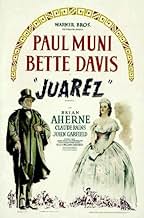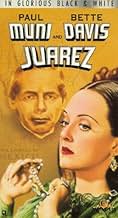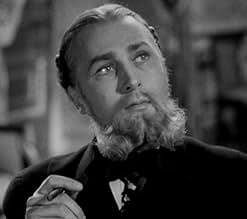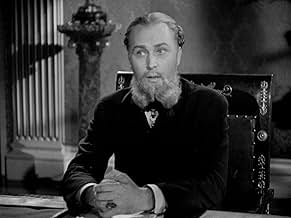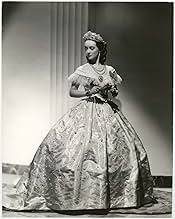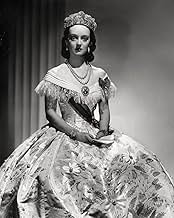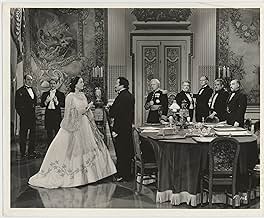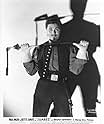Füge eine Handlung in deiner Sprache hinzuLouis Napoleon III (Claude Rains) takes advantage of the American Civil War to circumvent the Monroe Doctrine and expand his power by helping Emperor Maximilian von Habsburg (Brian Aherne) t... Alles lesenLouis Napoleon III (Claude Rains) takes advantage of the American Civil War to circumvent the Monroe Doctrine and expand his power by helping Emperor Maximilian von Habsburg (Brian Aherne) to add Mexico to his empire.Louis Napoleon III (Claude Rains) takes advantage of the American Civil War to circumvent the Monroe Doctrine and expand his power by helping Emperor Maximilian von Habsburg (Brian Aherne) to add Mexico to his empire.
- Für 1 Oscar nominiert
- 3 Gewinne & 1 Nominierung insgesamt
Empfohlene Bewertungen
The people are represented by Paul Muni impersonating Mexican president Benito Juarez; his expressionless face and slow, monotonous line readings are almost laughable; he comes across as a sort of Unconquerable Zombie of the People. He almost always appears in the same frame as a portrait of his hero and contemporary, Abraham Lincoln. As others have pointed out, his most powerful moment comes when he walks purposefully toward a line of armed soldiers in one of those moments of truth at the core of all successful revolutions: the refusal of the armed forces to defend the established regime.
The hounded monarch, Archduke Maximilian, is played by Brian Aherne in what may well be the best casting he was ever assigned on film. His performance is letter perfect as the idealistic puppet of Napoleon III who stuck to his outmoded principles despite overwhelming odds in much the same way as Nicholas II did in Russia decades later. In another parallel to the later Russian events, his domineering wife Carlotta (played by a beautifully photographed, no-holds-barred, black-bewigged Bette Davis) takes matters into her own hands to support his flimsy but ardent claim to the leadership of the country; Aherne, like Muni, is also frequently seen in proximity to a framed portrait - of his wife.
This is an expensive production with lavish costumes, stunning set pieces, gorgeous music, literate dialogue, a who's who of excellent supporting players, and breathtaking photography (the latter by veteran cameraman Tonio Gaudio, some of whose visions, especially Carlotta's prayer to the Virgin Mary and her final scene in a sunlit chamber, recall the most ethereal imagery of the silent era). All of these elements work together to get our blood surging in sympathy for the downtrodden Mexican peasantry as they rise up against cold hearted official corruption. And on a smaller level we feel equally moved by the personal plight of Maximilian.
With so much stuffing, not everything works perfectly. John Garfield, one of the best film actors of his time, is unconvincing as a Mexican general. There is a problem with pacing and informational overkill. Muni's sleepwalking performance contributes to a sense of sluggishness. Whenever he appears you brace yourself for a plodding and profound dose of Great Truth. At least these Truths are not banalities, so they are somewhat worth waiting for.
The film is historically correct and that is part of the problem. The filmmakers put every incident that led to the fall of Maximillian into the story and the film drags on and on. It's more information that we need to know.
There are mixed opinions on the Bette Davis portrayal of Empress Carlotta, the unstable wife of Maximillian. Hers is an interesting story but Davis may not have put enough incipient madness into her characterization.
On the whole,this is a pretty good history lesson with no Hollywood happy ending tacked on, that tells of a well meaning, gentle man who was badly used by the French emperor, sent to rule a people of whom he knew nothing, in a land where he was not wanted. And Aherne absolutely is perfect for the part.....he is the star of this film.
Muni is almost frightening with his impassive face and his slow delivery.If looks could kill,his certainly would...
Davis ,although she does not look like Charlotte physically ,gives a captivating portrayal of the empress.The scene when she prays Virgin Mary is impressive ,but not true: she was not sterile,but she and the emperor used to sleep apart!Their relationship was much more complex than the one depicted by Dieterlé: actually,the emperor was often away,it seemed that their strange love worked from a distance.Little by little,Maximilian lost all interest in power and Charlotte was ruling while he was gone (which often happened)or was staying in his Cuernavaca "paradise" .
Aherne is Maximilian in the flesh.It's interesting to notice that his brother Francis-Joseph had deprived him of all his rights and his titles in Austria.Historians generally agree that he would not have accepted the Mexican throne,if Charlotte had not been his wife. the problem is that the film doesn't show us the couple BEFORE they get to Mexico:one thing to bear in mind is that Max did not accept the throne overnight;and many people in Europa (notably Queen Victoria and Empress Elizabeth aka "Sissi" ) had warned them it was more a curse than a blessing.Charlotte (Carlotta) ,someone reportedly said ,wanted to reign over any people anywhere.Sissi called her Max's black angel. Maximilian is depicted as a chivalrous noble sovereign which he was in a way.But of course ,he had lots of (Mexican)lovers since he didn't sleep with his wife
Dieterlé does not pass over in silence the obnoxious role played by Napoleon the Third (and wife Eugénie de Montijo).Charlotte does show her contempt:"He is an impostor,his family is not an old one like ours ".The famous scene of the orangeade is included .Today,no serious historian would put forward that the drink was poisoned.But it might be possible that she was poisoned before leaving Mexico.Davis shines when she plays these scenes of madness.The scenes in Paris are not thoroughly accurate though:Eugenie (an incredibly beautiful Sondergaard) met first Carlotta alone in the Grand Hotel -they did not invite her to the Tuileries,which meant a lot about what they felt-Metternich was not the person who helped Carlotta :she first took refuge in the Vatican where the pope had trouble to get rid of her,then her sister-in-law Marie -Henriette ,queen of Belgium,came to her rescue when she was treated almost like a prisoner in Miramar.
All that concerns Maximilian's death is accurate ,his last words were "poor Charlotte!"
Poor Charlotte indeed.She was to outlive almost everyone,even Empress Eugenie! She died in 1927,after years and years of insanity with occasional moments of lucidity ,notably during WW1.
Dieterlé's movie is by no means uninteresting,but it would be exciting to film a remake in the light of the recent works about the Mexican adventure.
Wusstest du schon
- WissenswertesBecause the film shows a number of Maximilian's generals to be Mexican, many viewers attribute it to typical Hollywood historical distortions. It is, however, indeed accurate. It's a little-known fact that, although Maximilian was eventually overthrown and executed by Mexican revolutionaries, there were more Mexicans fighting on Maximilian's side than against him. This was due in large part to the Catholic Church's strong support of the French occupation of Mexico and its encouraging of Mexican Catholics to fight against the revolutionary forces by joining Maximilian's army, which they did in large numbers.
- PatzerWhen Napoleon III is informed in a letter that Robert E. Lee has been defeated at Gettysburg, he responds by paraphrasing Lincoln's famous Gettysburg Address by calling democracy as government for the people, by the people, etc. He couldn't have known Lincoln's speech flourish because it wasn't given until November 19, 1863, more than four months after the battle.
- Zitate
Emperor Louis Napoleon III: Democracy! Government of the cattle, by the cattle, for the cattle!
- Alternative VersionenIn 1952, the film was re-released and several key scenes were removed, particularly sequences that contained dialogue that criticized countries which, in 1939 had been regarded as totalitarian, but which, by the early 1950s had become Cold War allies of the United States and could therefore no longer be criticized as imperialist adventurers. Germany and Italy, especially, former enemies in the 1940s, were now the cornerstone of NATO. The removal of these scenes obfuscated the narrative considerably, in particular, removing any clear reasons behind the execution of the Emperor Maximilian at the conclusion of the film. This revised print runs 106 minutes and is the version released on video and generally available today. The 1939 version is preserved on nitrate stock in the Warner Archive.
- VerbindungenFeatured in Hollywood and the Stars: The Angry Screen (1964)
- SoundtracksMy Country Tis of Thee
(uncredited)
Music attributed to Henry Carey (1744)
Played as part of the score when America is mentioned
Top-Auswahl
- How long is Juarez?Powered by Alexa
Details
- Laufzeit2 Stunden 5 Minuten
- Farbe
- Sound-Mix
- Seitenverhältnis
- 1.37 : 1
Zu dieser Seite beitragen



